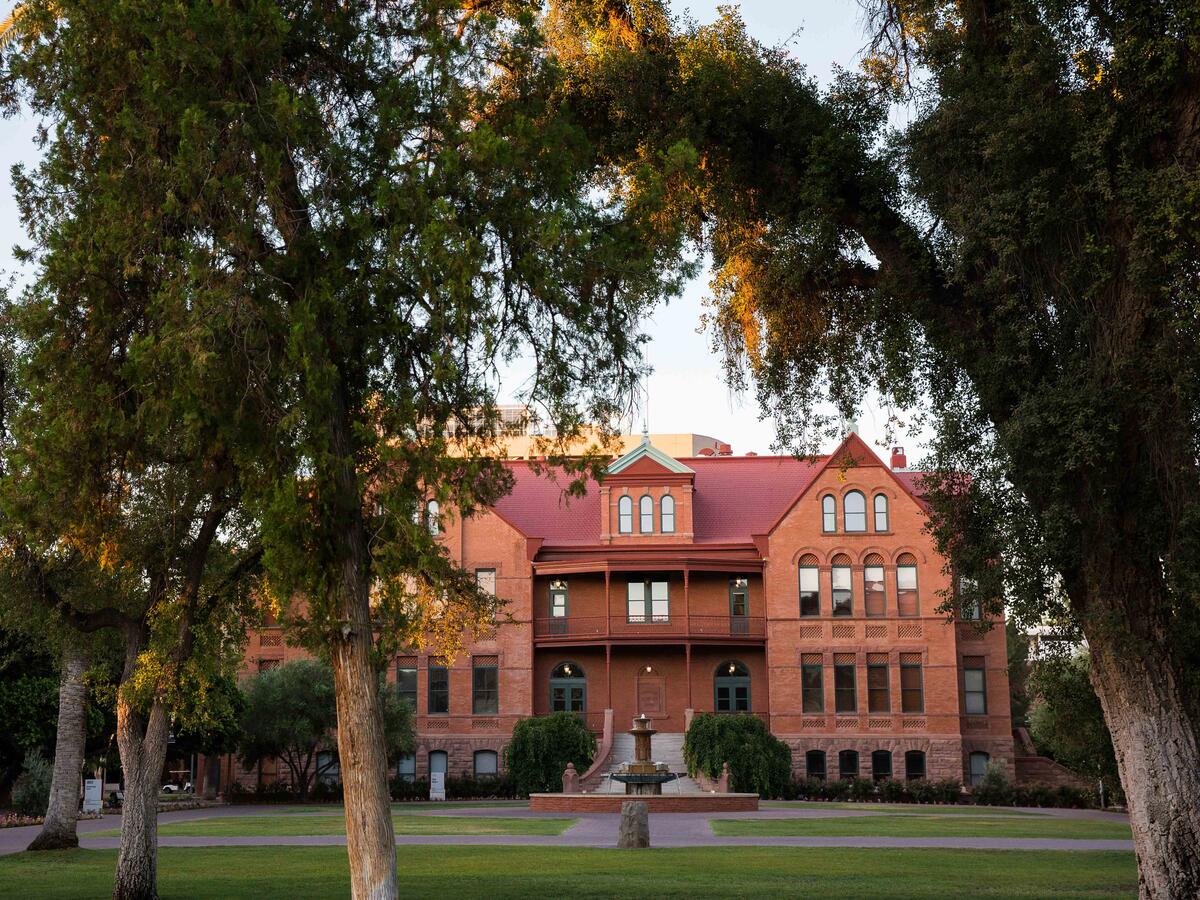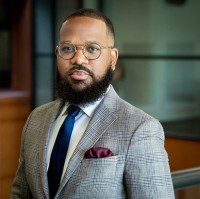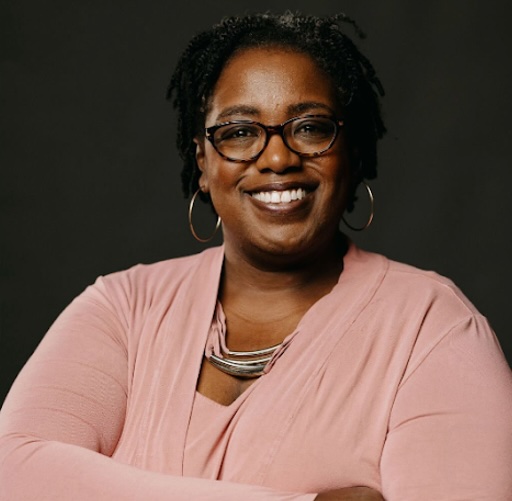
Desert Skies Symposium 2025
February 20-22, 2025
Arizona State University
We welcome you to Arizona State University's Tempe Campus for the 17th Biennial Meeting of the Desert Skies Symposium. Since 1989, Desert Skies has facilitated dialogue about music learning and teaching in many contexts, and looks forward to continuing this tradition.
Information about this year's symposium can be found below!
Registration is now open!
Register Here
Keynote Speakers
 Kevin Lawrence Henry, Jr. is an award-winning scholar of race, racism, and education policy and practice. Dr. Henry is an Associate Professor in the Department of Educational Leadership and Policy Analysis at the University of Wisconsin-Madison. His interdisciplinary scholarship revolves around the intersections of school choice/market-based approaches to education—specifically charter schools and the charter school authorization process; political economy; the politics of education; anti-Blackness; educational justice; and Black educational imaginaries. More specifically, Dr. Henry’s research examines how the persistence of anti-Blackness and white supremacy shapes Black peoples’ educational experiences and how the perspectives and practices of Black educational actors can reshape and transform the field of education to be more just and equitable. As a qualitative methodologist, Dr. Henry’s interdisciplinary scholarship draws on Critical Race Theory (CRT), Black Studies, and Political Science.
Kevin Lawrence Henry, Jr. is an award-winning scholar of race, racism, and education policy and practice. Dr. Henry is an Associate Professor in the Department of Educational Leadership and Policy Analysis at the University of Wisconsin-Madison. His interdisciplinary scholarship revolves around the intersections of school choice/market-based approaches to education—specifically charter schools and the charter school authorization process; political economy; the politics of education; anti-Blackness; educational justice; and Black educational imaginaries. More specifically, Dr. Henry’s research examines how the persistence of anti-Blackness and white supremacy shapes Black peoples’ educational experiences and how the perspectives and practices of Black educational actors can reshape and transform the field of education to be more just and equitable. As a qualitative methodologist, Dr. Henry’s interdisciplinary scholarship draws on Critical Race Theory (CRT), Black Studies, and Political Science.
Dr. Henry has published in the American Educational Research Journal, Educational Policy, Teachers College Record, among others. He is the co-author, with Colleen Capper of the forthcoming Organizational Theory for Equity and Diversity, 2nd Edition (Routledge) and co-editor with Kevin Clay of The Promise of Youth Anti-Citizenship: Race and Revolt in Education (University of Minnesota Press). His research has been supported by the Spencer Foundation and the William T. Grant Foundation, where he served as a writing fellow in the Research to Reduce Inequality in the Lives of Young People Initiative. Dr. Henry currently serves on the editorial boards of Educational Evaluation and Policy Analysis, Equity & Excellence in Education, and the Journal of Research on Leadership Education. Dr. Henry is also the co-editor of Routledge’s Educational Leadership for Equity and Diversity series.
Prior to returning to Wisconsin, Dr. Henry served on faculty at the University of Arizona in the College of Education and was a founding member of and policy fellow in the Education Policy Center
 Loneka Wilkinson Battiste is an international scholar with over 20 years of experience teaching music in school and community settings. Prior to joining the Music Education faculty at the University of Houston as an Associate professor of Music Education, she served on Music Education faculty at the University of Tennessee-Knoxville. Dr. Battiste’s scholarly interests include culturally responsive teaching and Black musical aesthetics. Her work has been published in the Choral Journal, Journal of Historical Research in Music Education, Journal of General Music Education, Proceedings of the International Society for Music Education, and General Music: Dimensions of Practice. In addition to presenting scholarship at local, national, and international conferences and symposia, Dr. Battiste is also an active clinician who presents workshops on culturally responsive teaching and Black musical aesthetics. She has been a featured clinician for the Texas Music Educators Association conference in San Antonio, Texas, and was the featured mini-conference presenter for the Organization of American Kodály Educators national conference.
Loneka Wilkinson Battiste is an international scholar with over 20 years of experience teaching music in school and community settings. Prior to joining the Music Education faculty at the University of Houston as an Associate professor of Music Education, she served on Music Education faculty at the University of Tennessee-Knoxville. Dr. Battiste’s scholarly interests include culturally responsive teaching and Black musical aesthetics. Her work has been published in the Choral Journal, Journal of Historical Research in Music Education, Journal of General Music Education, Proceedings of the International Society for Music Education, and General Music: Dimensions of Practice. In addition to presenting scholarship at local, national, and international conferences and symposia, Dr. Battiste is also an active clinician who presents workshops on culturally responsive teaching and Black musical aesthetics. She has been a featured clinician for the Texas Music Educators Association conference in San Antonio, Texas, and was the featured mini-conference presenter for the Organization of American Kodály Educators national conference.
Dr. Battiste is dedicated to international engagement with music education. In 2019, she completed a Fulbright Fellowship in Recife, Pernambuco, Brazil, where she studied music of the Xambá community. She has given speeches and papers in Recife, Pernambuco, Brazil; João Pessoa, Paraiba, Brazil; and Crato, Ceára, Brazil. In July 2023, she shared her research on Coco da Xambá at the International Council for Traditional Music Conference in Accra, Ghana. In September 2023, she gave the closing keynote for the Brazilian Music Education Association (ABEM) national conference in Ouro Preto, Minas Gerais, Brazil.
She is a member of the Smithsonian Folkways Education Committee and Higher Education Advisor for the Organization of American Kodály Educators. She served on the Tennessee Music Education Association Board as the Society for Music Teacher Education Representative and Research Chair. She has also served in various leadership positions in the Society for Ethnomusicology, including Co-Chair of the Education Section, Co-Chair of the Crossroads Section, and Co-Chair of the Gertrude Robinson Network of Scholars.
View the conference program by clicking the button below!
Need help navigating campus? See the map below. (Please note: All sessions take place in Old Main).
See all of the abstracts related to each paper session at the link below.
Airport
Phoenix Sky Harbor International Airport is the main airport serving the Greater Phoenix area. It serves more than 40 million passengers a year, and goes to more than 100 domestic and international destinations, making it one of the 10 busiest airports in the U.S. With about 1,200 daily flights—about 500 nonstop—Sky Harbor is one of the most convenient airports and is about six miles from the campus and the conference hotel.
The conference hotels (Hyatt House and Hyatt Place) have a free shuttle between the hotel and airport. Connect with the front desk for the airport shuttle. Directions from Sky Harbor Airport.
Housing
Rooms are available at a nightly rate on February 19-22 at Hyatt Place and Hyatt House (both are housed in the same building). To reserve a Double Queen, please visit Hyatt Place and to book a king suite visit Hyatt House. The rate for a double queen is $169.00 and the rate for a king suite is $159.00.
Booking Directions
Online. Use your group-specific link to navigate to the hotel website, click “book now”, select your arrival and departure date then click “book now” again (the link puts the group code in for you). The Hyatt Place-King Group Code is G-2080 and Hyatt House-Double Queen Group Code is G-6399.
By Phone. Call 888-591-1234 and ask to reserve a room within the group block using the specific property name and group code.
Group rooms/rates will only be available over the contracted group dates. Each guest is responsible for paying their own room, taxes, incidentals, and damages. If you need additional dates or any further assistance please contact Christopher Villalpando, Manager of Sales, at 480-219-5956 or via email, [email protected].
Getting Around Tempe
Hyatt Place and Hyatt House are located approximately 0.5 miles away from Old Main, the site of the Symposium. You may use the following link to find directions across campus—Travel Between Hyatt Place, Hyatt House, and the Old Main.
If there are conference attendees who need assistance traveling from the hotel to the Symposium space, transportation is available at the start and end of each Symposium day—please use the below form if you need a ride. An ASU Music Learning and Teaching representative will be in contact with details.
If you need to park on campus, please use this form (this link has been updated for access to those outside ASU): Parking at Desert Skies 2025
The Desert Skies Symposium has used the following presentation format for several years, and we will continue with this format for the 2025 event.
Sessions are 90 minutes long. Each 90-minute session will begin with eight to nine one-minute lightening talks given by each of that session’s presenters. The lightening talks are session overviews to help attendees select three presentations to attend. Attendees will then go to one of the presentation tables/spaces, where authors will present seated at a table to six to ten attendees.
Typically, presenters do not read entire papers. We ask that you prepare a presentation of your research in a format that fosters engaging discussion and questions from those who have selected your session. Some presenters choose to use slides and/or audio/video clips using their personal laptop computers. We will have some laptops/ipads available for presenters to use if needed. Some past presenters chose to provide handouts or an outline. Neither is required. Additional ideas are welcome!
After about 25 minutes, groups rotate, and presenters repeat to a new small group, then another rotation occurs. In other words, you will present/discuss your research three times, each time with a different small group of attendees, during the same 90-minute session.
**The call for papers is now closed.**
The Desert Skies Symposium on Research in Music Learning and Teaching invites submissions for the seventeenth biennial meeting, to be held February 20-22, 2025, on the Tempe campus of Arizona State University.
You are invited to submit papers related to research on music learning and teaching in any context. The Desert Skies Symposium conceives of research broadly and encourages the submission of a variety of methodologies and styles of inquiry.
We encourage applications from college and university faculty, graduate and undergraduate students, preK12 music educators, teaching artists, music therapists and music therapy researchers, and community music educators. Finally, we explicitly encourage work that centers equity and justice as well as interdisciplinary study and community-based or community-inspired work.
Submit your abstract of 700-800 words (references not included in word count) by 11:59 pm Pacific Standard Time on Sunday, September 15, 2024 as an attachment with this link.
Include the author or first author’s last name in the filename (e.g., Smith.DesertSkies.2023).
Download a copy of the 2025 CFP here.